Could CBD products help to make you a better cyclist?
From reducing pain to promoting relaxation and sleep, myriad are the claims made for cannabidiol – but do they stack up? Rob Kemp finds out
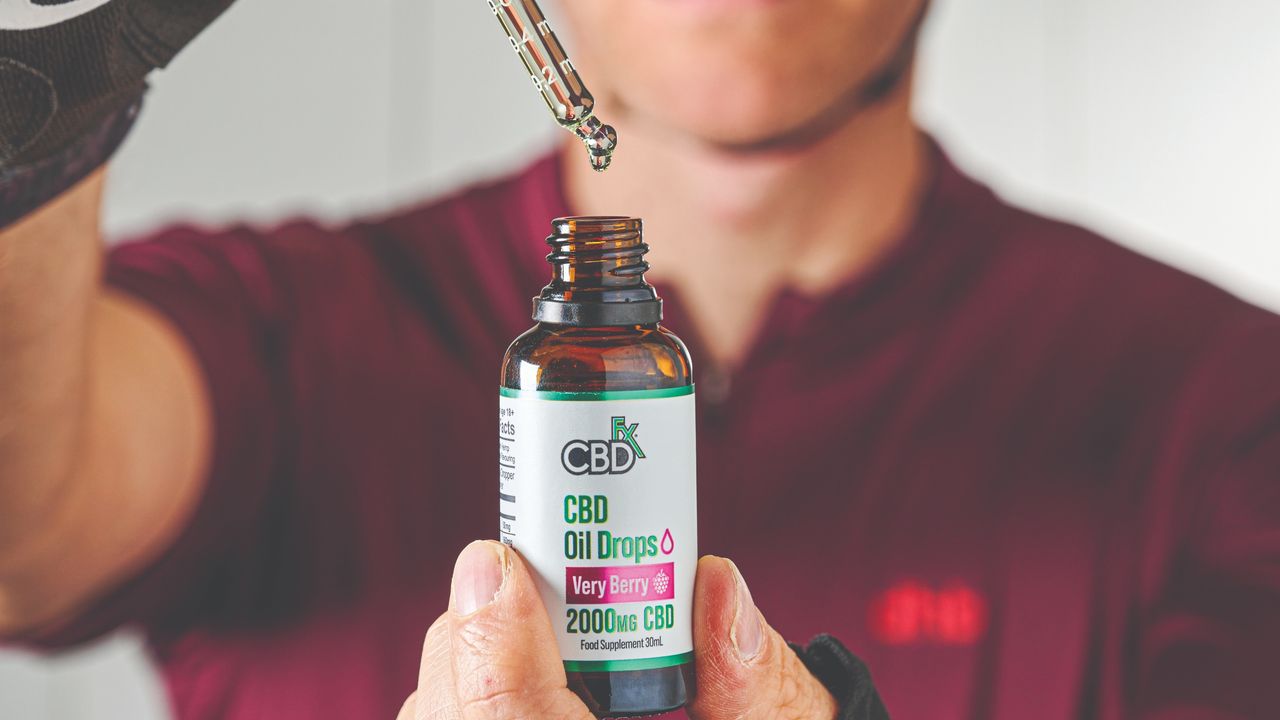

This feature first appeared in Cycling Weekly magazine, to subscribe, click here. We've also explored CBD products with more information for US readers, here.
CBD, or cannabidiol, is a non-intoxicating compound found in cannabis plants, marketed widely for its potential therapeutic benefits. It’s reported to have some effervescent-like effects on the body’s endocannabinoid system; that’s the part that regulates various functions including mood, sleep, appetite, and pain.
Unlike THC, another compound in cannabis, CBD doesn’t produce a ‘high’. Some research suggests CBD may alleviate anxiety, reduce inflammation, alleviate pain, and help with epilepsy – though much of this is up for debate, as we’ll see. The popularity of cannabidiol has surged in recent years, leading to various CBD-infused products like oils, edibles, and topical gels. But scientific evidence supporting its many claims is still evolving, and regulation of CBD products varies from country to country.
What’s in it for cyclists?
CBD has been touted by cyclists and some coaches as an aid for post-training recovery, improving sleep and reducing anxiety. Several elite riders – including German Continental-level pro Wolfgang Brandl and US ex-pro Peter Stetina – have given CBD greater credence by advocating its calm-inducing qualities.
“There are no specific studies on CBD and cycling, but for sports generally CBD can aid sleep and thus recovery,” insists Professor Michael Barnes, honorary professor of neurological rehabilitation and a director for the Maple Tree Medical Cannabis Consultancy. “It is anti-inflammatory and analgesic, so it will help with areas of muscle inflammation and pain, combating DOMS, stiffness or cramps. And CBD can calm cyclists down before a big race.”
What does the research say?
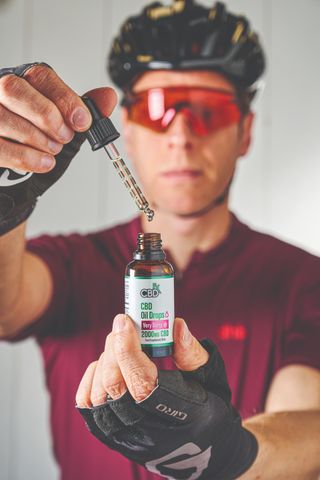
Many in the sports science community are sceptical about the real-world benefits of CBD for cyclists. “We have data under review showing it does not enhance performance,” explains Graeme Close, a sports nutrition consultant and professor of Human Physiology at Liverpool John Moores University. “I guess that’s a good thing, otherwise WADA might have had to consider putting it back on the doping list.”
Professor Close and others remain interested in exploring how CBD may help with sleep and recovery – but they insist that solid data on this is still lacking. “We know athletes struggle with sleep at times and recovery is often the key to winning races, so if it does help, it will be massive. We just need to remember that the plural of anecdote is not data, so we need to continue to research in this space.”
Get The Leadout Newsletter
The latest race content, interviews, features, reviews and expert buying guides, direct to your inbox!
One animal study published in the European Journal of Pain suggests CBD, when applied to skin, could help reduce pain and inflammation resulting from arthritis. Some small studies, including a 2020 report published in the journal Frontiers in Pharmacology suggest that CBD may inhibit inflammatory and neuropathic pain. University of Colorado Boulder research on athletes found that the cannabis extract had no performance- enhancing qualities. One study found it resulted in slower performances, but the study subjects did report that exercise was more enjoyable when using CBD.
How to reap the benefits?
“When it comes to a recommended or optimal format for CBD usage among cyclists, I don’t think there is one as yet,” says Professor Close. “The legal landscape is very complicated, subject to the Novel Food Regulations, and recently it was declared that there was not enough data to suggest a safe upper limit for CBD. Without this, the advice was given to limit consumption to less than 10mg. But I cannot see any evidence that doses this low will do anything of note. So, if the advice is not to take more than 10mg for safety reasons, then we need to question whether it’s worth consuming at all.”
Professor Barnes, who advocates for using CBD, also points out that the dose needed remains a contested question. “Unhelpfully, the Food Standards Agency has said that no more than 70mg should be taken daily and recently even recommended a limit of 10mg. This is based on no credible evidence, and the average dose needed for most of the beneficial effects is in the range 60- 120mg daily of oil for under-the-tongue use. The maximum recommended dose in Australia is 150mg, so why the UK is so mean with suggested dosing is a mystery.”
Expert Comment: Graeme Close

“If CBD does anything, it’s aid sleep and recovery,” concedes Professor Close. “There is some suggestion that if your lack of sleep is anxiety-related, then it may help. But if your lack of sleep is your poor sleep hygiene – scrolling through your smartphone all night – then it’s unlikely to help. We are very interested in CBD from an inflammation perspective, and for recovery,” Close continues. “But, as I say, the data is still very early. There are some suggestions that it can help recovery, so if this is the case then it may – and I stress may – help over multiple days of cycling.
“For localised pain, a topical preparation is best for rubbing on the affected area,” is the suggestion of CBD proponent Barnes. “For more generalised aches and pains or sleep and anxiety then an under-the- tongue route is best although it can also be taken by mouth. It can also be vaped for a very quick effect.” “You’d be better off getting the purported benefits of CBD by other means,” says Close. “Make sure you are consuming 1.5g of protein per kilo of body weight per day and split this into four or five even doses throughout the day. Also, fuel your hard rides with carbohydrates, and stay hydrated. For relaxation and recovery, be sure to get yourself into a sleep routine with a similar bedtime and wake-up time – and ditch the screens an hour before bed. Read a good book instead. Have a hot shower pre-bed before heading to a cool bedroom – it will drop your core temp to initiate sleep.”
What are the limitations or doubts?
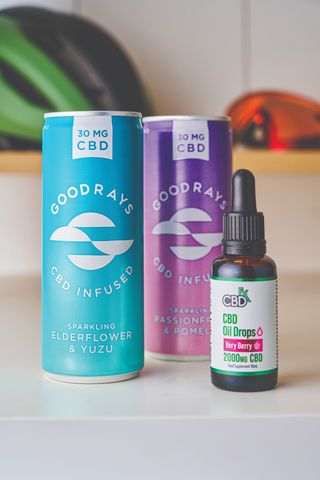
“Given that it’s been under prohibition for many years, the whole cannabis and cannabinoid area of performance research is massively lacking,” says Professor Close. “While CBD is not prohibited by WADA, all other cannabinoids are – it’s not just THC that is banned. We have data showing that in some CBD products there are enough other cannabinoids to fail a doping test. So, it’s very risky for athletes to take at the moment, and will remain so until there has been more work in this space to clarify the doping risks. Also, there is data to show that many CBD supplements have illegal quantities of THC in them despite not stating this on the label, while others contain no CBD at all.”
Conclusion
There are too many grey areas around the purported properties of CBD to make it worth adding to your performance arsenal, at least for the time being. “WADA risks, safe upper limits, cheap products that may not contain what they say, these are all risks – as well as suggestions of unintended interactions with other drugs,” says Professor Close. “For example, if you are on certain medications, you should not take CBD. Much more research is needed before I would give any solid recommendations.”

Thank you for reading 20 articles this month* Join now for unlimited access
Enjoy your first month for just £1 / $1 / €1
*Read 5 free articles per month without a subscription

Join now for unlimited access
Try first month for just £1 / $1 / €1

Rob Kemp is a London-based freelance journalist with 30 years of experience covering health and fitness, nutrition and sports sciences for a range of cycling, running, football and fitness publications and websites. His work also appears in the national press and he's the author of six non-fiction books. His favourite cycling routes include anything along the Dorset coast, Wye Valley or the Thames, with a pub at the finish.
-
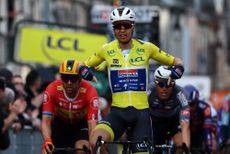 'It's one to remember' - Tim Merlier makes it two from two at Paris-Nice
'It's one to remember' - Tim Merlier makes it two from two at Paris-NiceBelgian wins second stage in Bellegarde ahead of French duo Emilien Jeannière and Hugo Page
By Tom Thewlis Published
-
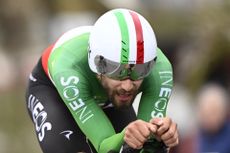 'Emotion helped me push harder' says Filippo Ganna, after blistering Tirreno-Adriatico stage one TT win
'Emotion helped me push harder' says Filippo Ganna, after blistering Tirreno-Adriatico stage one TT winThe Italian favourite came true to form with a super-strong negative split ride
By James Shrubsall Published